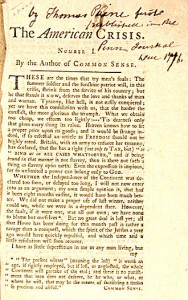Good morning, Whitewater.
Saturday in town will be sunny with a high of twenty-nine. Sunrise is 7:21 and sunset 4:23, for 9h 01m 46s of daytime. The moon is a waxing gibbous with 60.6% of its visible disk illuminated.
It’s understandable that in ordinary usage we refer casually to many kinds of trees as pine trees – pine is meant as a shorthand term for evergreens. What, though, is the difference between pines, spruces, and firs? Minute Earth describes them for us:
On this day in 1776, Paine begins publication of the American Crisis series:
The American Crisis is a pamphlet series by 18th century Enlightenment philosopher and author Thomas Paine, originally published from 1776 to 1783 during the American Revolution. Often known as The American Crisis or simply The Crisis, there are sixteen pamphlets in total. Thirteen numbered pamphlets were published between 1776 and 1777, with three additional pamphlets released between 1777 and 1783.[1] The first of the pamphlets were published in Pennsylvania Journal.[2] Paine signed the pamphlets with the pseudonym, “Common Sense.”
The pamphlets were contemporaneous with early parts of the American Revolution, during a time when colonists needed inspiring works. Paine, like many other politicians and scholars, knew that the Colonists weren’t going to support the American Revolutionary War without proper reason to do so. They were written in a language that the common man could understand, and represented Paine’s liberal philosophy….
Paine sees the British political and military maneuvers in America as “impious; for so unlimited a power can belong only to God.” Paine states that he believes God supports the American cause, “that God Almighty will not give up a people to military destruction, or leave them unsupportedly to perish, who have so earnestly and so repeatedly sought to avoid the calamities of war, by every decent method which wisdom could invent”.
Paine takes great lengths to state that Americans do not lack force, but “a proper application of that force” – implying throughout that an extended war can lead only to defeat unless a stable army was composed not of militia but of trained professionals. But Paine maintains a positive view overall, hoping that this American crisis can be quickly resolved, “for though the flame of liberty may sometimes cease to shine, the coal can never expire.”[5]
For the full work, see Thomas Paine, The Writings of Thomas Paine, Collected and Edited by Moncure Daniel Conway (New York: G.P. Putnam’s Sons, 1894). Vol. 1. 12/19/2015. <http://oll.libertyfund.org/titles/343>

